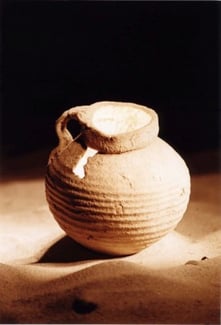
In his novels, Walker Percy presents flawed heroes that face crises of the human spirit and walk through the land of faith on a search. Percy invites his readers to “wake up” to this search that breaks through everydayness. His novel, The Moviegoer, unfolds during Mardi Gras celebrations in New Orleans and concludes on Ash Wednesday as an image of a journey for life transformed in Christ’s life, death, and resurrection. We are reminded that, created in the image and likeness of God, "the search" a metaphor for human freedom and fulfillment, is realized only in Christ.
The divine image is present in every man. It shines forth in the communion of persons.
Christ in “the very revelation of the mystery of the Father and of his love, makes man fully manifest to himself and brings to light his exalted vocation.... It is in Christ, Redeemer and Savior, that the divine image, disfigured in man by the first sin, has been restored to its original beauty and ennobled by the grace of God....He finds his perfection ‘in seeking and loving what is true and good.’ By virtue of his soul and his spiritual powers of intellect and will, man is endowed with freedom, an ‘outstanding manifestation of the divine image.’" Catechism of the Catholic Church, 1701 – 1705.
The search leads Percy’s characters to relationships that were there all the time. His protagonists experience coming fully to themselves. They awaken to "the water that does not run dry, the food and drink that alone can satisfy" (John 4:4). A convert to Catholicism, Percy struggled with questions post-modern Catholics are still asking. His search led him to live in his own “place of nowhere," Covington, Louisiana. His "place of nowhere" metaphor recalls losing ourselves in God to find our true center, and includes the realty that we are sent back into the community where God dwells. We are called, Pope Francis reminds us, to be missionary disciples in communion.
We are a “community of believers trained and inspired to go out to transform politics, society, education, neighborhoods, family and marriages. We are called to be converted followers of Jesus, who, together with others, share Jesus’ life and faithfully seek to spread their joy, life and love to those who have not yet come into that twofold communion” (Aparecida document).
St. John Paul II expressed this as our vocation to be led by the spirit of the Gospel to contribute to the sanctification of the world like leaven from within. Resplendent in faith, hope and charity as we manifest Christ to others. (Christifideles laici, n. 15).
 Blessed James Alberione
Blessed James Alberione
Through the writings of Blessed James Alberione I have come to a deeper understanding of what it means to integrate the spiritual life into "everydayness." Alberione considered everything a gift of God that invites our unwrapping and response, “We all live off his generous bounty, gift after gift after gift” (John 1:16). He opened all the gifts available to him: scripture, great religious traditions in the Church, church documents, theology, the Eucharist, press, radio, television, the sciences, sociology, etc. to create a great synthesis in Jesus as he defined himself “way, truth and life” (John 14:6). Holiness consists, he wrote, in living in Christ as St. Paul lived Christ until we say "it is no longer I who live, Christ lives in me" (Gal. 2:20).
“The final reality with which we must all deal,” writes David Tracy, “is neither our own pathetic attempts at self-salvation, nor the horror of life in all its masks, nor even the frightening reality of sin in our constant attempts to delude ourselves and others; rather that final reality is the hard, unyielding reality of the Pure unbounded Love disclosed to us in God’s revelation of who God is and who we are commended and empowered to be in Christ Jesus.”
Grace is pure gift that transforms our everyday life. Our response to this gift is spirituality, where as Percy intimated, we come to the true center of ourselves, "no longer we who live, but Christ" (Gal. 2:20). Deacon Keith Fournier sums up these thoughts well in The Hunger of the Human Heart:
"Christian revelation answers the existential questions that plague every human heart. It presents the path back to a full communion with God through our response to His invitation of surrendered love. This path is paved by the exercise of our freedom. We are called to empty ourselves and be filled with His presence. He is the God who comes to us. Our lives, lived now in God, through Christ, are to proceed through prayer. Prayer [Catholic spirituality] opens up the classroom of communion where we can learn and discern the truth about whose we are - and who we can become....The right exercise of our freedom is the doorway to a lifetime of response to the continual invitations to communion. God invites, we respond."
Dante, in the Divine Comedy, after professing his faith to Saint Peter, describes that light as a "spark, which then becomes a burning flame and like a heavenly star within me glimmers." (Paradiso XXIV, 145-147; Lumen Fidei. n.4)
Copyright 2016 Sr. Margaret Kerry, fsp
Photos:
Lit Jar; Sr. Mary Emmanuel Alves, Used with Permission
Family, Barnard Family, Used with Permission
Blessed Alberione; Society of St. Paul, Used with Permission
Lamp; Sr. Mary Emmanuel Alves, Sr. Margaret Kerry (photoshop), Used with Permission
Sources:
Rolheiser, Ronald, O.M.I., Course notes, 2009.
The Holy Longing, Ronald Rolheiser, N.Y. Random House, 1999, pg. 135 ff.
Tracy, David, On Naming the Present, N.Y. Orbis Books, 1994, Pg. 101.
About the Author

Sr. Margaret Kerry, fsp
A Daughter of St. Paul for 40 years Sr. Margaret continues to pursue new ways to proclaim the Gospel: sharing the Pauline Charism with the laity, writing books (St. Anthony of Padua: Fire & Light; Strength in Darkness: John of the Cross; Prayers for the New Evangelization), & through direct evangelization. She is available for workshops on the Vocation & Mission of the Laity, Media Literacy, and The New Evangelization. mkerry@paulinemedia.com


.png?width=1806&height=731&name=CatholicMom_hcfm_logo1_pos_871c_2728c%20(002).png)
Comments